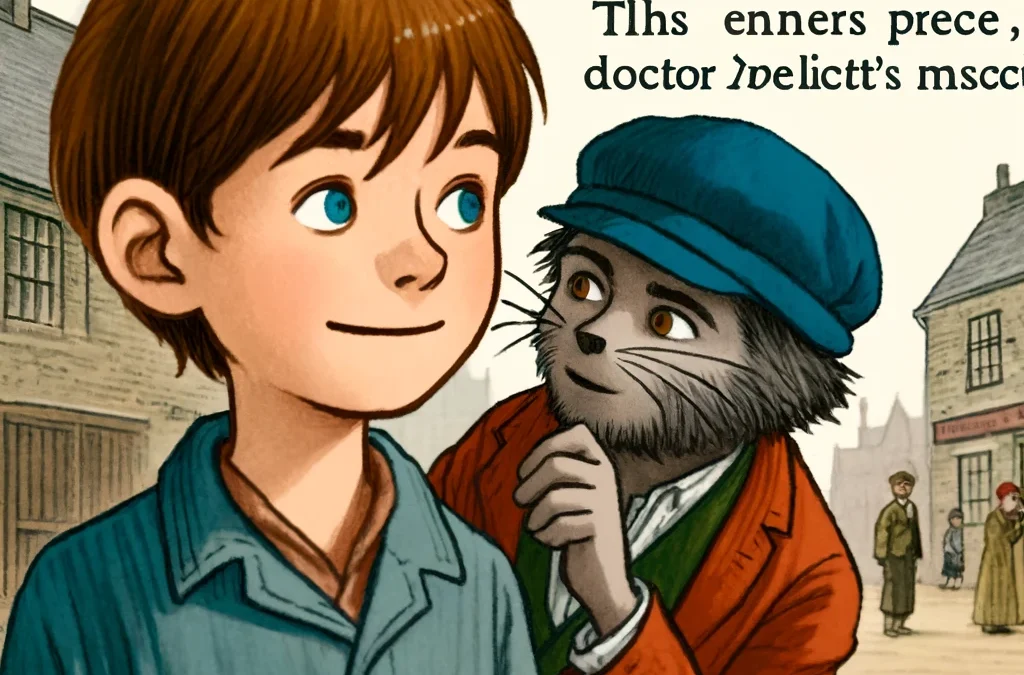『ドリトル先生航海記』【1-2-2. えらい博物学者の話を聞く】
※カラフル対訳で紹介している作品はすべてパブリックドメインです。
このサイトで使われている作品のすべては著作権の切れた名作などの全文を電子化して、インターネット上で公開しているProject Gutenberg(プロジェクト・グーテンベルク)、LibriVox(リブリヴォックス、朗読図書館)の作品を出典としています。
翻訳者:satoyayo4080
監修:中務秀典
“How did he get to know so much about animals?” I asked.
「どうやって動物に詳しくなったの?」と私はたずねた。
The cat’s-meat-man stopped and leant down to whisper in my ear.
猫肉屋は立ち止まり、かがみこんで私の耳元で囁いた。
“He talks their language,” he said in a hoarse, mysterious voice.
「先生は動物たちの言葉を話すのさ」と彼は何やらわけありげにしゃがれた声で言った。
“The animals’ language?” I cried.
「動物の言葉?」と私は叫んだ。
“Why certainly,”[もちろん] said Matthew.
「そうだよ」とマシューは言った。
“All animals have some kind of a language. Some sorts talk more than others; some only speak in sign-language,[手まね言語] like deaf-and-dumb.
「すべての動物は何らかの言葉を持っているんだ。より多く話す種類もいれば、聾唖(ろうあ)者のように手マネでしか話せないのもいる。
But the Doctor, he understands them all—birds as well as animals.
でも、先生にはみんな分かるのさ。動物だけでなく鳥の言葉も分かるんだ。
We keep it a secret though, him and me, because folks only laugh at you when you speak of it.
わしらはそれを秘密にしているけど、わしと先生の間のな。そんなことを話したって人々は笑うだけだからな。
Why, he can even write animal-language.
先生は動物の言葉もお書きになる。
He reads aloud to his pets.
先生は自分の動物たちに声に出して読んであげている。
He’s wrote history-books in monkey-talk, poetry in canary language and comic songs for magpies to sing. It’s a fact.
猿語で歴史の本を書いたり、カナリア語で詩をつくったり、カササギが歌う滑稽な歌を書いたりされる。これは本当のことなんだ。
He’s now busy learning the language of the shellfish.
先生は今、貝の言葉を習うのに忙しいそうだ。
But he says it’s hard work—and he has caught some terrible colds, holding[ある状態・位置に保っておく] his head under water so much. He’s a great man.”
でもそれは大変な仕事だそうだーひどい風邪をひいてしまったんだ。頭を水の中に長い間入れっぱなしにしていなくてはならないからね。(ともかく)先生はえらい人なのさ」
“He certainly must be,” I said. “I do wish he were home so I could meet him.”
「確かにそうみたいだね」と私は言った。「家にいたらいいな。そうすれば、会うことができるんだけど」
“Well, there’s his house, look,” said the cat’s-meat-man—“that little one at the bend in the road there—the one high up—like it was sitting on[座っている] the wall above the street.”
「ほら、あそこが先生の家だ」猫肉屋が言った。「あの道の曲がり角にある小さくて、高いところにある、通りの上の壁に乗っかっているように見えるのがそうさ」
We were now come beyond the edge of the town.[町の端を超えて来た] And the house that Matthew pointed out[指摘する] was quite a small one standing by itself.[一軒立ち]
私らはすでに、町はずれまで来ていた。そしてマシューが指さした家はかなり小さくポツンと建っていた。
There seemed to be a big garden around it;
家の周りには大きな庭があり、
and this garden was much higher than the road, so you had to go up[登る] a flight of steps[踊り場と次の階の間の階段] in the wall before you reached the front gate at the top.
庭は道よりずっと高いところにあるので、一番上にある表門にたどり着くには壁のなかの段々を登っていかなければならなかった。
I could see that there were many fine fruit trees in the garden,
庭には立派な果樹がたくさんあり、
for their branches hung down over the wall in places. But the wall was so high I could not see anything else.
ところどころ、枝が壁に垂れ下がっているのが見えた。でも、壁が高すぎて他には何も見えなかった。
When we reached the house Matthew went up the steps to the front gate and I followed him.
家に着くとマシューは階段をのぼって表門に行き、私は彼についていった。
I thought he was going to go into the garden; but the gate was locked.
私はマシューが庭に入るのかと思ったのだが、門には鍵がかかっていた。
A dog came running down from the house;
一匹の犬が家から駆け下りてきて、
and he took several pieces of meat which the cat’s-meat-man pushed through[無理に押し通す] the bars of the gate, and some paper bags full of corn and bran.
猫肉屋が門の鉄格子の間から入れてやった肉片を数切れを受け取った。それから、トウモロコシやぬかのいっぱい入った紙袋も(受け取った)。
I noticed that this dog did not stop to eat the meat, as any ordinary dog would have done, but he took all the things back to the house and disappeared.
私はこの犬が、普通の犬のように、すぐに肉を食べるのではなく、全部持って家に戻り姿を消してしまったことに気がついた。
He had a curious wide collar round his neck[首回り] which looked as though it were made of brass or something. Then we came away.[離れる]
首の周りには真鍮か何かでできているように見える奇妙な幅広い首輪をつけていた。そして、私たちはその場を去った。
“The Doctor isn’t back yet,” said Matthew, “or the gate wouldn’t be locked.”
「先生はまだ戻っていないようだな」とマシューは言った。「でなければ門がロックされているわけがないからな」
“What were all those things in paper-bags you gave the dog?” I asked.
「犬にあげた紙袋に入っていたのは、いったい何だったの?」と私は尋ねた。
“Oh, those were provisions,”[供給, 支給] said Matthew—“things for the animals to eat.
「ああ、あれは食料だよ」とマシューは言った。「動物たちが食べるためのものさ。
The Doctor’s house is simply full of pets. I give the things to the dog, while the Doctor’s away, and the dog gives them to the other animals.”
先生の家はまったく動物だらけだからな。先生がいない間はわしがあの犬に食糧を渡して、犬が他の動物たちにそれを配っているんだ」
“And what was that curious collar he was wearing round his neck?”
「それと、首に巻いていたあの奇妙な首輪は何だったの?」
“That’s a solid gold[純金] dog-collar,” said Matthew. “It was given to him when he was with the Doctor on one of his voyages long ago. He saved a man’s life.”
「あれは金無垢の首輪さ」とマシューが言った。「昔、あの犬が先生と一緒に航海した時にもらったそうだ。人の命を救った(お礼にもらった)んだよ」
“How long has the Doctor had him?” I asked.
「いつから飼っているの?」と尋ねた。
“Oh, a long time. Jip’s getting pretty old now.
そりゃ、ずいぶん前からさ。ジップもかなり老けてきたな。
That’s why the Doctor doesn’t take him on his voyages any more. He leaves him behind to take care of[面倒を見る] the house.
だから先生はもうあの犬を航海に連れて行かないんだ。彼は家の留守番をさせるために置いていくのさ。
Every Monday and Thursday I bring the food to the gate here and give it him through the bars.
毎週、月曜日と木曜日に、わしはこの門に食べ物を持って来て、鉄格子越しにあの犬に渡すんだ。
He never lets any one come inside the garden while the Doctor’s away—not even me, though he knows me well.
あの犬はわしのことをよく知っているが、先生がいない間は誰も庭には入れさせないんだ。わしでさえな。
But you’ll always be able to tell[いつでも見分けることが出来る] if the Doctor’s back or not—because if he is, the gate will surely be open.”
先生が戻っているかどうかはすぐにわかるさ。戻ってきていら門は間違いなく開いているだろうからな」
So I went off[(立ち)去る] home to my father’s house and put my squirrel to bed in an old wooden box full of straw.
それで私は父の家に帰って、藁でいっぱいにした古い木箱の中にリスを寝かせた。
And there I nursed him myself and took care of him as best I could till the time should come when the Doctor would return.
そこで私は先生が戻ってくる時までできる限りの看病し世話をした。
And every day I went to the little house with the big garden on the edge of the town and tried the gate to see if it were locked.
毎日、私は町はずれの大きな庭のある小さな家に行き、門に鍵がかかっていないか試してみた。
Sometimes the dog, Jip, would come down to the gate to meet me.
時々、犬ジップが門に降りて出迎えてくれた。
But though he always wagged his tail and seemed glad to see me, he never let me come inside the garden.
でも、いつも尻尾をふって、私を見て喜んでいるようだったけど、けっして庭の中には入れてくれなかった。

